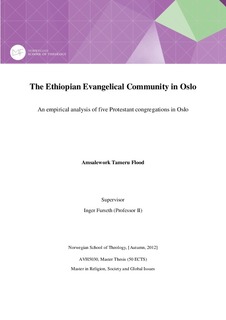The Ethiopian Evangelical Community in Oslo : An empirical analysis of five Protestant congregations in Oslo
Master thesis
Permanent lenke
http://hdl.handle.net/11250/161365Utgivelsesdato
2013-09-09Metadata
Vis full innførselSamlinger
Sammendrag
The objective of this thesis is to see if Ethiopian Evangelical communities in Oslo are
a positive or a negative force in the process of integration. Integration has been a debatable
topic in many immigration countries. Within the last decades, various forms of tensions have
occurred all over Europe due to policies and practices by which immigrants and offspring of
immigrants have been incorporated to the structures of host communities. In the Norwegian
politics as well, this topic has often been argued for or against in a number of forums. There
have been reoccurring signals from the side of immigrant background people to point out the
question of integration is far from resolved.
Correspondingly, it is visible that the hosting Norwegian society has not yet figured
out a desirable reference to how the newer members of its communities flocking from all
corners of the globe may be incorporated. The government has shown an obvious
apprehension concerning the negative effects of ethnic enclaves (Guro Ødegård 2010). This
concern has called attention to immigrant voluntary associations to see which premises they
employ to form their existence. Immigrant associations can play a role in furthering or
hindering incorporation of their members into the different spheres of the host community.
When they on one hand can facilitate an easier transition for new immigrants, they on the
other hand can block integration by building tight bond among the members, to use Robert
Putnam’s expression, they provide a bonding social capital that excludes the majority group
(Putnam 2000: 22-23). So, to see if the Ethiopian Evangelical community in Oslo facilitates
linkages to the larger society or it blocks further integration is the main task of this research.
The thesis explores how the community forms the terms by which their members create
connections to the life in their new land.
